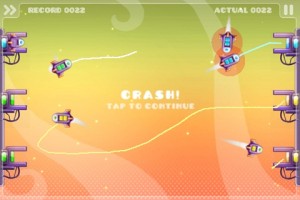What would happen if air traffic controllers managed planes from their iPhones, directly tracing flight paths over the touchscreen? If Playing Species’ Space Tap (Out Now, $0.99) is any indication, it could work out surprisingly smoothly — but let’s just hope the controllers get a good tutorial before they’re dumped into action!
Space Tap is something of a trial by fire for anyone who picks it up randomly on the App Store. After selecting one of six levels, the player’s taken to a screen where rocket ships begin pouring in, and there’s absolutely nil in the way of instruction! A little experimentation brings to light the fact that the player guides each ship by tapping on it and tracing out a path. Figuring out where to go from there is a little harder, and the head-scratching will likely continue until one of the ships crashes into another or gets sucked into a black hole, triggering a Game Over.
 To save you some frustration if you found this article while looking for a little guidance, let’s sum up the game’s nuts and bolts. Each ship’s color matches at least one of the level’s tube-like docking ports. The player’s goal is to guide each ship into a matching port, where it will proceed to unload its cargo before turning around to let him or her know it’s ready to be guided back out into the cosmos. Efficiently getting ships docked and sent on their merry way means there’s fewer left onscreen for the player to juggle once the next wave of traffic hits, so a calm and steady approach is even more critical to survival than a keen eye for imminent crashes. Space Tap’s concept is so intuitive in hindsight, but having an intuitive game doesn’t always mean you can skimp on the tutorials. Hopefully at least a static tutorial will find its way into updates.
To save you some frustration if you found this article while looking for a little guidance, let’s sum up the game’s nuts and bolts. Each ship’s color matches at least one of the level’s tube-like docking ports. The player’s goal is to guide each ship into a matching port, where it will proceed to unload its cargo before turning around to let him or her know it’s ready to be guided back out into the cosmos. Efficiently getting ships docked and sent on their merry way means there’s fewer left onscreen for the player to juggle once the next wave of traffic hits, so a calm and steady approach is even more critical to survival than a keen eye for imminent crashes. Space Tap’s concept is so intuitive in hindsight, but having an intuitive game doesn’t always mean you can skimp on the tutorials. Hopefully at least a static tutorial will find its way into updates.
Naturally, the fun in Space Tap comes from the fact that there’s an ever-increasing number of ships swarming in the longer the player holds out, and each level has its own characteristic hazards — the aforementioned black holes, and vortices that re-direct flight paths, feature prominently. It helps that the interface is silky smooth, and there are some really nice touches: each ship has a cargo bar that depletes during the docking phase to let the player know how much longer its turn will take, and arrows mark the entry paths of incoming ships well before they enter. I’m sure the mysterious info bar at screen top or screen bottom – it shifts from level to level so it doesn’t get in the way – would also be helpful if I could figure out what it’s trying to tell the player exactly.
 Other than lack of a tutorial, Space Tap’s greatest liability is its traditional infinite design. The six levels are played indefinitely until a crash occurs, and feature the usual challenge curve that ramps up only gradually — leaving the veteran player to slog through the slower parts again after a failure. On balance, the developer did something pretty cool in giving the player a fast forward button that doubles the game’s speed, and this lends each level some replay value. What the game doesn’t compensate for is the absence of a sense of progression: all levels are unlocked right from the start and there’s nothing to upgrade, so there’s little depth to back up the traffic management premise.
Other than lack of a tutorial, Space Tap’s greatest liability is its traditional infinite design. The six levels are played indefinitely until a crash occurs, and feature the usual challenge curve that ramps up only gradually — leaving the veteran player to slog through the slower parts again after a failure. On balance, the developer did something pretty cool in giving the player a fast forward button that doubles the game’s speed, and this lends each level some replay value. What the game doesn’t compensate for is the absence of a sense of progression: all levels are unlocked right from the start and there’s nothing to upgrade, so there’s little depth to back up the traffic management premise.
Screen caps reveal that Space Tap’s aesthetics aren’t quite Retina-sharp, but I certainly found the presentation crisp enough while playing in real time. All levels play to the same soothing space tune and the game currently silences out external iTunes tracks even if the music is turned off. Whether you’ll get much mileage out of Space Tap depends entirely on whether you’re big on traffic management games already. If you are, this is a game you’ll likely be whipping out for the occasional bus ride, and if you aren’t, it’ll last only the half hour to forty-five minutes it takes to give each level a good whirl.
iFanzine Verdict: If you stick with Space Tap long enough to figure out what you’re actually supposed to do, you’ll find it a solidly designed line drawing/traffic management mashup. Best appreciated by genre fans who are keeping an eye out for something that’s much more free-form than the typical road or rail management formula.


